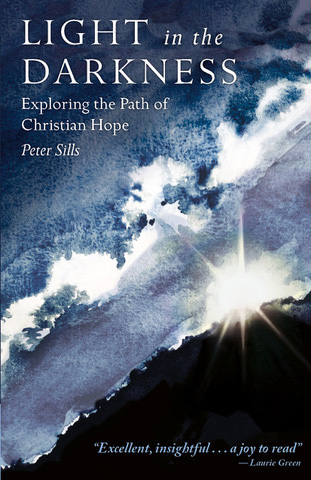 [ISBN 978-1-78959-100-2] Price £14.99
[ISBN 978-1-78959-100-2] Price £14.99
To be human is to hope, and what we hope for shapes our lives and the path we follow. Taking to heart the petition in the Lord’s Prayer that the Kingdom shall ‘come on earth as it is in heaven,’ Light in the Darkness explores the path of Christian hope asking what it means for human society, and for each person, if we really want heaven on earth. The Christian hope is often thought of simply as a hope for the life to come, but if we are true to Jesus’ prayer, then our hope cannot be limited in this way, and must be also for the life here and now; as the Christian Aid slogan put it: We believe in life before death. Inspired by the Advent Antiphons, seven praises and prayers that have been used by Christians for more than a thousand years, and by the I am sayings of Jesus, I explore seven hopes: for truth, justice, freedom, a new beginning, enlightenment, peace and love. These hopes are universal – the hopes of people in every age and of all faiths.
Light in the Darkness offers a considered Christian response to the ideas that shape the modern world, a path of hope which integrates the different aspects of life: personal and political, ethical and economic, spiritual and social. Contrary to those who dismiss Christian faith, I believe it offers a distinctively deeper understanding of life than secular approaches, challenging the basic economic and individualistic nostrums that many assume to be the only way. There is an alternative; there is another path, where truth is discovered through a personal relationship and not simply in a series of empirical propositions; where justice is about ensuring fair outcomes and not just fair procedures; where freedom is seen as given for personal and social fulfilment, not just from constraint; where a true new beginning is one that enables us to take our past into our future healed, rather than hidden or denied; where enlightenment is to live by the light of Christ rather than by the secular values of today’s world; where peace is founded on reconciliation – moving into a new reality marked by the presence of justice not simply the absence of conflict; where love is more than affection or sexual attraction, leading us on the path of self-giving, being with another come what may, as God is with us.
Light in the Darkness is written for thoughtful Christians and Christian leaders who want to deepen their spiritual resources. It is written also for ‘the serious middle ground’, those who, while not expressing a Christian commitment, are open to the insights that the faith offers in responding to the challenges we face in the contemporary world. The style is serious and engaging, but does not assume too much in the way of Biblical or theological knowledge. I raise challenging issues, particularly about the way economic ideas, our individualistic culture, and the legacy of the Englightment shape hope in the modern world, and offer a Christian response founded on the example and teaching of Jesus of Nazareth.
I am pleased to say that the book is warmly commended by those who have read the drafts –
An excellent study; insightful, scholarly, sensible and written in a style that is a joy to read. Erudite and full of wisdom, the connections it makes between scripture and today’s world offer much for careful reflection. – Bishop Laurie Green
A real achievement. Written with a relaxed ease, it is a delight to read. I warmed to the way that the themes are teased out with an impressive range of theological, economic, biblical and literary reference. This is a book for Christians to get their teeth into without feeling hampered by a lack of theological or biblical education. – Dr Bridget Nichols
This thoughtful and challenging book is a treasure trove. Hope is central to the Christian faith and these meditations on it contain much to nourish that hope. It deserves to be widely read. – Dr John Inge, Bishop of Worcester
These thoughtful and prayerful reflections offer an admirable way of reflecting on the place of faith and hope in today’s world. – Professor Canon Robin Gill
